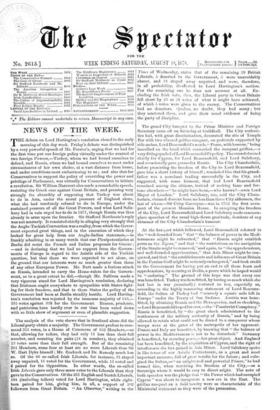NEWS OF THE WEEK
THE debate on Lord Hartington's resolution closed in the early morning of this day week. Friday's debate was distinguished by a very powerful speech of Mr. Forster's, urging that we had for the first time put our foreign policy virtually under the control of two foreign Powers,—Turkey, whom we had bound ourselves to defend, and Russia, whom we had bound ourselves to meet under circumstances of her own choice, at a vast distance from home, and under conditions most embarrassing to us ; and also that for Conservatives to support the policy of overriding the power and privilege of Parliament, was virtually for Conservatives to initiate a revolution. Sir William Harcourt also made a remarkable speech, restating the Greek ease against Great Britain, and pressing very strongly the absurdity of supposing that Turkey was about to do in Asia, under the moral pressure of England alone, what she had resolutely refused to do in Europe, under the sustained pressure of all the Great Powers, and what Lord Salis- bury had in vain urged her to do in 1877, though Russia was then already in arms upon the frontier. Sir Stafford Northcote's reply was not masterly. It consisted chiefly in alleging very strongly that the Anglo-Turkish Convention was a reality,from which the Gover- ment expected great things, and in the execution of which they looked for great help from our Anglo-Indian statesmen,—in frankly admitting in so many words that our Plenipotentiaries at Berlin did resist the French and Italian proposals for Greece ; —and in declaring that we had no support from the Govern- ments of Europe in regard to the Asiatic side of the Turkish question, but that there we were expected to act alone, on the ground that our interests were so much greater than those of any other European Power. Mr. Butt made a furious attack on Russia, intended to carry the Home-rulers for the Govern- ment, as to a great extent he did,—though Mr. Sullivan made a very vigorous stand for Lord Hartington's resolution, declaring that Irishmen ought everywhere to sympathise with States fight- ing for their freedom, and that to these States the policy of the Government had been at Berlin steadily hostile. Lord Harting- ton's resolution was rejected by the immense majority of 143,- 195 votes against 338 for the Government. Reason, prudence, and patriotism have hardly ever in our time been voted down with so little show of argument or even of plausible suggestion.






























